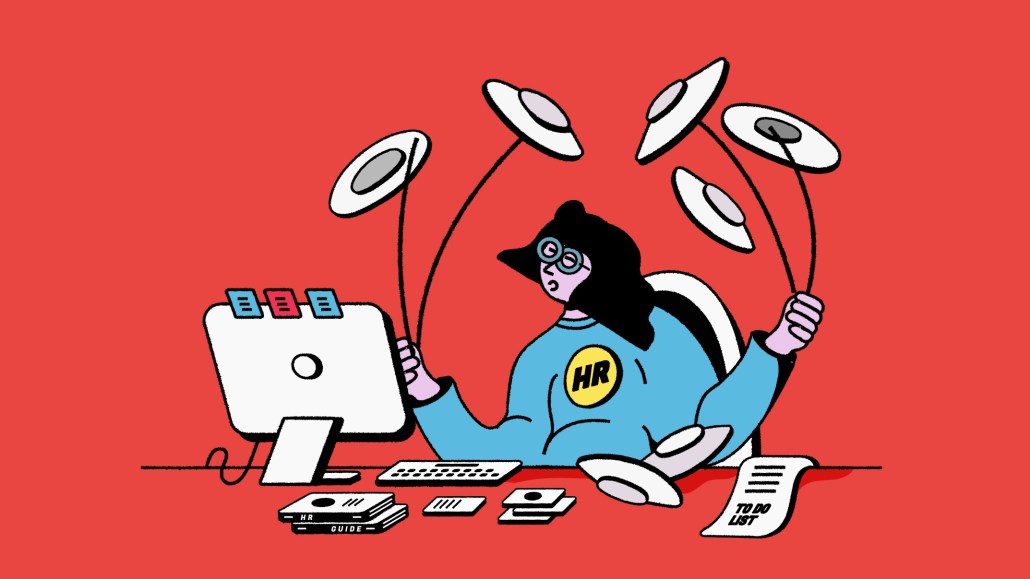Secure your place at the Digiday Media Buying Summit in Nashville, March 2-4
‘Your career doesn’t have to be your entire life’: Why some companies are encouraging side hustles

After falling in love with the white beaches and crystal waters of St Thomas in the U.S. Virgin Islands while honeymooning in 2012, marketer Stephanie Knoeck and her husband Ben decided to relocate there from Chicago in 2015.
In August 2020, after years of consideration, they started a boat charter company. “It was now or never,” she said. “I didn’t expect much from year one and have been pleasantly surprised. We’d love it to continue to grow.”
The Knoecks are two of 4.4 million people in the U.S. who started a business in 2020 — a 24% increase from 2019. But what’s more remarkable is that Stephanie remains a full-time senior director of client success at WorkReduce, a flexible staffing provider for the media and marketing industry. She’s still a career marketer, with no plans yet to step away.
And she isn’t alone. In the U.S., 34% of people started a side hustle this year, according to automated work platform Zapier, which surveyed 2,000 adults. Of these new part-time business owners, 38% were motivated by wanting to spend their time on something fun and creative, and 33% wanted to diversify their income streams, according to the same report.
While some employers may regard employees having a side hustle as an unwelcome distraction, others are actively encouraging their staff to pursue them. WorkReduce has developed somewhat of a side hustle culture and Stephanie’s colleagues have set up an eclectic mix of businesses, ranging from bike shops, doggy daycare businesses to podcast and YouTube channel hosting.
Founder and CEO Brian Dolan said it’s become an unintentional trend fostered by its fully remote and flexible workforce. For Dolan, it’s about reconciling the fear of distraction and resignation amongst side hustlers, with the benefits of engagement and satisfaction, especially in the face of the widely reported “Great Resignation” — citing the 1,000 open roles across the five ad agency holding groups WorkReduce services.
Just one WorkReduce employee has resigned to go full time on an outside venture. Not many have asked for reduced hours to focus more on these, but Dolan claimed he’d “jump through hoops” to accommodate staff who were delivering in their day job.
“There’s been a reckoning of how people think about work. We’ve seen a lot of people exit the ad industry. As an employer, you cannot afford to miss out on talent that your competitors are going after,” Dolan said.
“We’re trying to build the most diverse and talented workforce we can. If you’re doing that, you will attract people who have other interests, and those can go commercial at any time. Why not embrace that, if you want people to be their best selves? Your career doesn’t have to be your entire life.”
Naturally, staff need to be trusted to run their side hustle around their main work. Dolan said that once an employee took it too far and stopped attending meetings and hitting their objectives — they were fired.
Meanwhile London-based independent creative agency Here Be Dragons offers one-off “no-strings” cash injections, tech equipment and mentoring to junior staff who submit a side hustle business plan — even those leaving the company. So far one has left to start a jewellery business.
“Junior members of staff were most affected by the lockdown. Some didn’t even know what the workplace was like pre-pandemic. They joined a world of Zoom calls and probably thought ‘Is this it?’,” said Here Be Dragons founder and CEO Paul McEntee.
“We saw those as the most fragile, as their long-term view on ‘work’ was blown apart.” The generation entering the workforce are shunning traditional career routes in favor of new “pioneering paths,” he added.
“We have to prove we’re a good employer, by looking at personal progression, not career progression. What is best for that person, rather than the company? It changes the focus and cuts through the corporate bullshit,” said McEntee.
Independent trends forecaster Shivvy Jervis believes that with the rise of automated platforms and freelance consultants, starting a business has never been more accessible. Plus, side hustlers develop new skills which can be beneficial for their employers too.
“Providing a flexible working environment enables employees to pursue skills outside their normal range, which allows improvement for the workforce not at the company’s expense — a win/win,” said Jervis.
Encouraging employees to take their focus off full-time work seems counterintuitive. But HR expert and author of the book “Human Experience at Work,” Ben Whitter, said business progress is now more closely aligned “with the wants and needs of human beings.”
Side hustles are key within this because they allow people to build the lifestyle they want, rather than having something imposed on them by an employer, he added.
“People are more interested in experiencing joy and freedom rather than being stuck chasing promotions and unnecessary status symbols,” said Whitter.
“Make no mistake, employers are on notice. If they can’t support people to live their best life then employees will continue to take matters into their own hands. The costs associated with this will be too much to bear for many organizations.”
More in Marketing

Future of Marketing Briefing: AI’s branding problem is why marketers keep it off the label
The reputational downside is clearer than the branding upside, which makes discretion the safer strategy.

While holdcos build ‘death stars of content,’ indie creative agencies take alternative routes
Indie agencies and the holding company sector were once bound together. The Super Bowl and WPP’s latest remodeling plans show they’re heading in different directions.

How Boll & Branch leverages AI for operational and creative tasks
Boll & Branch first and foremost uses AI to manage workflows across teams.








